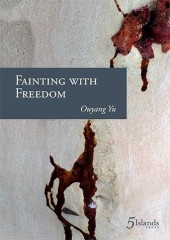 Reviewed by Magdalena Ball
Reviewed by Magdalena Ball
Fainting with Freedom
By Ouyang Yu
Five Islands Press
July 2015, ISBN: 9780734050250,
Ouyang Yu’s poetry works across languages, playing not only with form, but within the context of translation. Fainting with Freedom is full of binaries that bisect, clash, open outwards and close inward. We’re alerted to this notion of the ‘other’ right from the first poem, “50” in which the reader is told “you are your own alter-lggo”. The you might be the reader, it might be the English language, it might be the poet speaking to himself, or it might be someone else: the ego vs the alter-ego, a binary that directs the rest of the reading:
in your language, alter-ego
is the opposite of the alter-ego, not the mirror image but the reverse side
of the mirror. it requires a strange translation to make sense: know-heart
hence the alter-ego that knows the heart. not true. (“50″)
Time and again, the poetry confounds expectations and unpicks itself, structurally, grammatically, and linguistically, presenting what looks like a story, a letter, a footnote, a telegram, a Wikipedia entry, a diary entry, or even a simple poem about a single thing, only to undo the stereotype, the perception, or the form, through a reworking of its conventions. The poems are almost always meta-poetic, even when they don’t appear to be, using language in ways that stretch each word open, conscious of its counterpart, its translation, and its limitations:
I am a night
Lover
When darkness surrounds
On four sides
My heat becomes
Inky (‘Is this a poem?’)
Though words are definitely the focus in these poems, the way in which they work calls attention to their function, not only as signifiers, but also to the hierarchies of power that assigns value and meaning to them, both in a political and a literary sense:
top is always top till it becomes topless and that’s when
the eyes are happy. nothing in the bowels seems to be brewing anything
that is wanted, unlike the brains. (“Fame”)
Yu uses a variety of poetic techniques to undermine this hierarchy, from non-standard capitalisations and forms to rhythmic pulses, punctuation and the use of white space between words in his sentences. Language is familiar, and syntax/structure may appear normal at times (though at other times the words are shattered and spaced), but often the meaning is called into question by the intensity of its enjambment:
Cover one eye and see
the flesh of the s
ky in blueas the lip touches
th c
old water while the rest of I (“N”)
Many of the poems work through what appears to be a very personal scenario, such as the banality of an online relationship gone stale, marriage struggles, an evening walk, the writing down of a dream into a journal, or a day’s work, though this domesticity is undercut by a semiotic focus on the words and their broader meaning—violating the privacy of its setting by breaking out of the linguistic construct – whether that be eco-poetic, political (and language here is always political in one way or another), the poetry of relationships and attractions, depression, or the concept of loneliness and isolation:
Early morning, the empty door, the echoes somewhere upstairs
The walls with blind ears, the bare buildings in the rain
Noseless ones, the silenced trees, the lake slowly gathering
Trickles of effluence of an affluent sity, the cold seeping
Into the pores of one quietly living his loneliness (“The Great Chinese Loneliness”)
As is almost always the case in Yu’s poetry, the pain of migration and racism is an undercurrent throughout the work, though it’s handled in ways that are subtle and complex, playing with the interrelations between language (English being only one of a great many forms of discourse – even language itself being only one form of discourse), between racial perceptions, between meaning, and in the spaces between, inside, and beyond appearance and perception:
The way Australia was carrying on was probably wrong. Why was I hooked by
the idea of being small, being tiny, tinier than a word, as tiny as its core? (“A Sunday entry”)
Above all, Fainting with Freedom is a sensually exciting work. The poems don’t just mean things—they are also multisensory, using visual imagery and typographies such as the play on Chinese characters in “Talking about—-“, the auditory pleasures of “Tea” (“Say Anxi. Say Yingshan.”) or the scattergun text across the pages as with “Serendipity”. The overall impact is to remind the reader that the poetry is not just a representation, but that it has multiple, bisecting spaces of play for the reader to engage with.
Fainting with Freedom is a high energy collection that encourages the reader to take part in the play, noticing not only the details and images which the work illuminates but also the structures and strictures of the words themselves, the linguistic units, the punctuation, capitalisations and cases, the sounds, the shapes, the links and disconnections with the many other forms of expression that both undermine and bolster patriarchical language, poetry and culture:
Boat, oh, boat
Come and assault the sky
Of an incorruptible corruptness, pickled in poetry (“Four”)